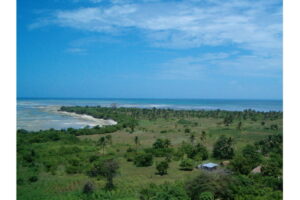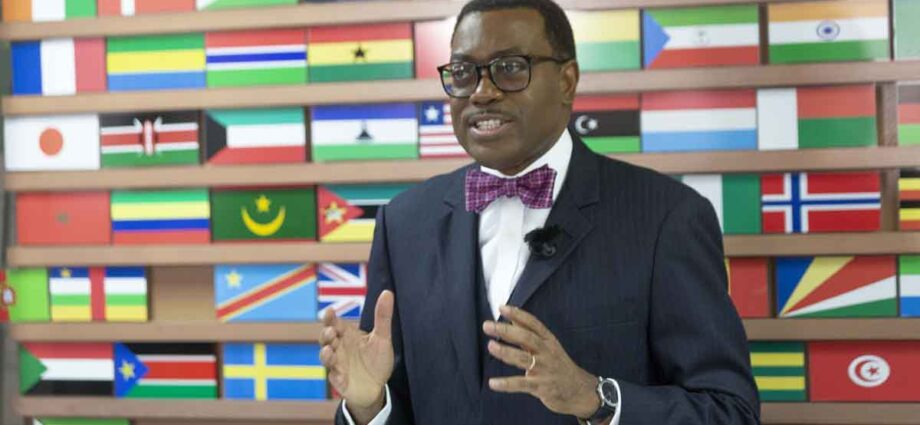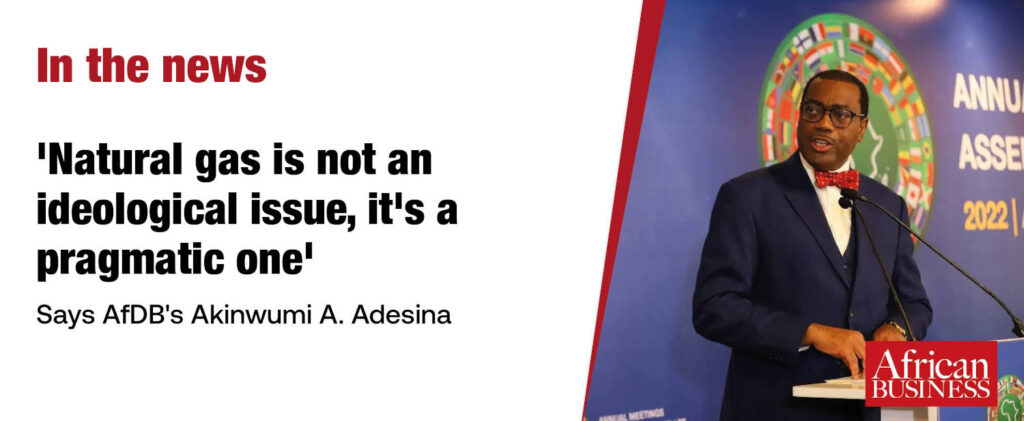The president of the African Development Bank shares his views on investment opportunities, financial management and the growing threat of climate insecurity.
At this year’s African Investment Forum in Abidjan, Akinwumi Adesina, president of the African Development Bank (AfDB), proudly announced $63.8bn in investment pledges for the continent.
African Business managed to catch up with him before he flew off to Sharm El-Sheikh to represent Africa’s case at this year’s UN Climate Conference (Cop27). He shared with us his views on investment opportunities, financial management and the growing threat of climate insecurity.
AB: The IMF announced that sub-Saharan Africa’s GDP is expected to slow sharply in 2022. Has it been harder to originate projects at the Africa Investment Forum? And what is investor interest like?
Akinwumi Adesina: Africa is no different from the rest of the world when it comes to the global challenges we face today. It’s a global economic slowdown, whether it’s in the US, China or the Eurozone. So, Africa is not unique in terms of that. But I think what is very important is that Africa recovered from the Covid-19 situation pretty well. Growth at that time went down by 1.6% and then went up to 6.9%. It has now been challenged by the war in Ukraine.
Growth has gone down because of obvious reasons. You’ve got energy costs that have gone up by three times, which includes the cost of transport and the cost of delivery of goods and services to people. You’ve got a lot of things that are happening now in terms of the price of food, because of the dislocation of supplies coming out of Russia and also out of Ukraine.
Global inflation is also happening. And you see what has also happened in terms of the monetary tightening policy all across the US and also with the ECB in Europe. The increase in interest rates has, of course, made a bad situation even worse for countries that depend on borrowing. All of this creates a lot of pressure on our economies. But I do feel that African economies are quite resilient. At the African Investment Forum I saw a lot of enthusiasm.
It’s not just about governments taking on debt. You will normally expect that there will be a significant outflow of capital from emerging markets as interest rates increase and people put more money back into US-held assets in the US. But the fact of the matter is that people are looking to Africa because of what it offers.
It offers a continent in which there are still opportunities to invest in energy. You’ve got 600m people that still need energy. That’s a lot of investment that you can make. The infrastructure deficit is still about up to $108bn a year. That’s a huge opportunity for investors. You’re looking at the issue of water and sanitation. You’re looking at digital infrastructure. Almost anything in Africa is an investment opportunity.
Here at the African Investment Forum, we were able to mobilise investment interest to Africa of $31bn in less than 72 hours. It just shows you that Africa is bankable. It tells you that people have confidence in infrastructure projects in Africa. It also shows you that people have confidence in projects that are brought to the Africa Investment Forum transactional platform.
They’re well-developed projects, they are well de-risked projects. And how we organise it with the heads of state in the room to discuss it with the investors. It’s a very new way of doing business in Africa, where the heads of state act as CEOs, and you can leave “Your Excellencies” at the door, but just get in there and do excellent projects.
What are the trends in terms of portfolio and investment flows? Are you seeing international capital pulling back?
I don’t think that international capital is moving back from Africa. It is the opposite. If you look at foreign direct investment in Africa, it has declined from about $47bn in 2019 to $40bn in 2020, but it rebounded to $83bn in 2021, which is double what it was in 2020.
As far as infrastructure is concerned, in the last seven years, we’ve invested upwards of $44bn. But despite all the great work that we do, our resources are not enough. The resources of all the multilateral development banks will not be enough. And there have been cases where you also find that China plays a very important role in terms of financing infrastructure in Africa. But you see a lot of pullback in time because they deal with their domestic issues in China.
So, the question is how do you finance infrastructure in a sustainable way going forward? First we must realise that infrastructure is not just the business of the state. In my view, it’s simply taking more loans, and more debt from the government’s books to finance infrastructure. A lot of infrastructure can and should be financed through at least public-private partnerships, opening up opportunities for the private sector in investing in infrastructure.
How do you attract the private sector to invest in infrastructure projects in Africa?
To attract the private sector means that there have to be a lot of bankable projects that they can invest in. And that’s why we have a facility here at the bank that’s called NEPAD Infrastructure Preparation Facility, in which we spent about $28m to support project development. It led to the downstream investment of $26bn in infrastructure. So, the rate of return on investment in project preparation is quite high because investors would tell you: we’ve got capital, show me the projects. Investing in feasibility studies is a priority.
We also need to make sure that we support institutional investors. Today, Africa has institutional investors, pension funds, sovereign wealth funds and other insurance pools of funds totalling $2.1 trillion of assets under management. If you just use 10% of that for infrastructure as an asset class, it would be about $210bn. That will solve all of Africa’s infrastructure financing and that would meet all of Africa’s energy gap.
What are the alternative forms of finance to fund the next generation of infrastructure and key development projects in Africa?
I’ll give you two examples. We were the first multilateral financial institution to do a synthetic securitisation in 2018 with institutional investors. We took assets off our books that are essentially private sector lending assets, and we rolled them over to the private sector and thereby freed up $1bn of investment by the private sector into those assets.
Another example happened just a few weeks ago, with the support of the UK government, which provided us with a guarantee facility, and also two reinsurances by Lloyd’s of London. We were able to free up $2bn of assets that are this time sovereign assets that would transfer again to institutional investors. Those kinds of capital efficiency efforts are what you need to get institutional investors in Africa to trust that they can invest and make money in investing in infrastructure.
The last thing I would say is that African countries should not under any circumstances use their natural resources to back infrastructure loans. We have to make sure that we finance infrastructure better. It’s not just how much money you put into infrastructure, it’s how efficiently that money is being used.
We financed a four-tier interchange in Ghana in Accra. It is the second largest in sub-Saharan Africa and the first in Western Africa. We spent only $94m doing that. And I was quite impressed how the government of Ghana used that money, which was supposed to be used for a three-tier interchange. They used the same amount of money to do a four-tier interchange and it had some left over. We need to use the capital for infrastructure more transparently, use it in a cost-efficient manner and reduce cost overload.
On the energy debate, how can the AfDB promote renewable energy, and, at the same time, provide development and electricity for all? How is the bank solving this equation?
Eighty-five percent of the Bank’s investment in energy generation in Africa is in renewable energy. We are the largest of any financial institution you would find in terms of that.
But I’m also a very pragmatic person. Africa needs to have an energy mix that allows it to have access to electricity, and energy, to have affordability for its population, and most importantly, to be able to have the security of supply for industrialisation. And so, natural gas plays a very important role in the energy mix of Africa, as it should.
It’s the same in the US, it’s the same in Europe, and it’s the same everywhere. Why is there a crisis in Europe when the Russians turned off the gas? We believe that natural gas is important. It’s not, for me, an ideological issue. It’s a pragmatic issue. Look at the following.
First is that moving from coal to natural gas, LNG to power for your coal-fired power plants would reduce your emissions by at least between 45 to 48%. Moving out of using firewood and charcoal, which is the main source of consumption of energy in Africa to liquefied petroleum gas would reduce emissions again significantly.
And you were talking about the issue of biodiversity when you have people depending on firewood and charcoal. Forget forests, forget biodiversity, forget ecotourism. Just because people are trying to get energy. And that’s why we need to provide energy to people.
And also, if you look at the transport system. We have projects here that have to do with gas projects that will provide gas for African countries to be able to do energy, liquefied petroleum gas for cooking. They’ll also be able to have compressed gas for the transport system and then, of course, to have gas pipelines that will go all the way from Lagos to Morocco, to Europe. And Africa becomes an alternative and a viable source of gas diversification, market diversification for Europe.
So, Africa can help to secure energy supply for Europe. This good for itself, is good for Europe and good for the environment. So, I am pretty excited about this project because it means that we are moving towards net zero. I always like to tell people that when we say energy transition, we try and meet that energy transition, but not spontaneously. It’s not like you turn off your light and then you turn it up and all of a sudden you have a different world. No, that would be unrealistic.
Last October, the Bank published a report which links security, investment, and development. What is the strategy to stem the consequences of insecurity? Are you worried, for example, about some countries in West Africa?
Three areas cause insecurity in Africa. One is a lot of displacement of populations because of climate change. Today, Africa faces more than 5m people a year who are displaced because of climate change. The environment is too dry. I was in Tanzania, in Mauritania. I went to parts of Mauritania which were so dry that nobody could live there anymore. And this is leading to increased rural poverty and rural-urban migration as a coping mechanism.
The other one is the lack of access to feed and resources for livestock and a shrinking amount of available space for crop production. That increased conflict between farmers and pastoralists all across West Africa. It’s all because of climate change.
If you take the Lake Chad Basin, it used to be about 25,000km square. It’s 2,500 now. Let’s imagine what has happened to the livelihoods of hundreds of millions of people. It’s easier for them to be recruited to turn against the state because they feel that they’ve been abandoned.
And the last part leading to insecurity is because of the high unemployment rate amongst the youth. And Africa has a fantastic young population. It’s our best asset, but you have a third of them unemployed and maybe a third of them that are also discouraged. And so that creates a situation which fuels insecurity.
There cannot be development unless there is peace and security. So, we’ve got to understand and tackle the fundamental sources or the root causes of these things. That’s why Africa needs at least $110bn to adapt to climate change. The developed countries promise to provide $100bn a year. The amount that’s on the table for Africa today is $18bn, of which only $11bnis actually for climate adaptation. Tackling these insecurity challenges that are driven by climate change means that the world, the developed countries, have to meet their obligation to developing countries in Africa.
Original story :https://african.business/2022/11/energy-resources/natural-gas-is-not-an-ideological-issue-its-a-pragmatic-issue-says-afdbs-adesina/
Source: afdb.org
Share this news
This Year’s Most Read News Stories

Serikali: Sampuli zilizochukuliwa hazijathibisha virusi vya Marburg
Wakati Shirika la Afya Duniani (WHO) likisema watu wanane wamefariki dunia kutokana na ugonjwa unaoshukiwa kuwa wa virusi vya Marburg (MVD) mkoani Kagera, Wizara ya Afya ya Tanzania imesema sampuli zilizochukuliwa hazijathibitisha uwepo wa virusi hivyo.Continue Reading

Muslims in Pemba conduct special prayer against ZAA decision
ZANZIBAR: More than 200 Muslims in Vitongoji Village, South Pemba Region over the weekend conducted a special prayer to condemn the Zanzibar Airports Authority (ZAA) move to appoint DNATA as the sole ground handler in Terminal III of the International Airport of Zanzibar. Abeid Amani Karume.Continue Reading

Dissecting the role of the insurance ombudsman in Tanzania
The basic purpose of an insurance plan is to provide financial security to you and your family in case of your misfortunes during the policy tenure.Continue Reading












